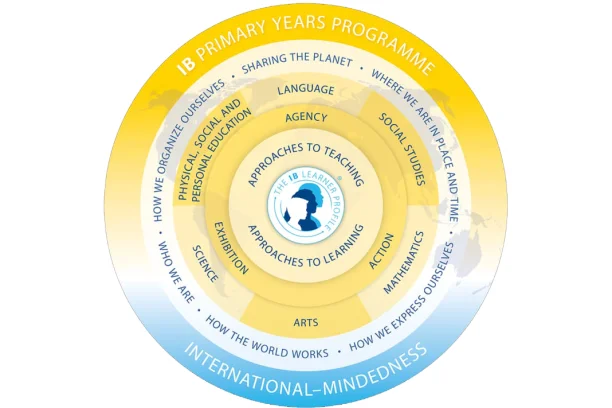

Primary Years Programme: The IB Primary Years Programme, for students aged 3 to 12 (early and Primary Years), focuses on the development of the whole child as an inquirer, both in the classroom and in the world outside. It is a framework guided by six transdisciplinary themes of global significance, explored using knowledge and skills derived from six subject areas, as well as transdisciplinary skills, with a powerful emphasis on inquiry.
∙ Early Years:
The early years (3–6-year-olds) experiences play a pivotal role in shaping future social and cognitive learning (McCoy et al., 2017). The PYP framework supports cognitive and social-emotional development through play-based inquiry whereas six transdisciplinary themes guide meaningful exploration. Children primarily learn through play, fostering curiosity and agency. This active inquiry process develops language skills, self-regulation, and a positive sense of identity, preparing them for lifelong learning.
Play in children's development highlights the importance of a developmentally appropriate environment for young children to learn at their own pace (Rushton, Juola-Rushton, and Larkin 2010). Inquiring through play in the early years supports the notion that learning is an active process. Healthy learning environments and supportive relationships, created and demonstrated by the learning community, further support this learning process.

∙Primary Years:
The International Baccalaureate aims to develop inquiring, knowledgeable and caring young people who help to create a better and more peaceful world through intercultural understanding and respect. The IB Programmes encourage students across the world to become active, compassionate and lifelong learners who understand that other people, with their differences, can also be right.
The IB offers high-quality programs of international education that share a powerful vision. An IB education:
• focuses on learners – the IB's student-centred programs promote healthy relationships, ethical responsibility and personal challenge
• develops effective approaches to teaching and learning – IB Programmes help students to develop the attitudes and skills they need for both academic and personal success
• works within global contexts – IB programs increase understanding of languages and cultures, and explore globally significant ideas and issues
• explores significant content – IB programs offer a curriculum that is broad and balanced, conceptual and connected.
Informed by values described in the learner profile, IB learners strive to become inquirers, knowledgeable, thinkers, communicators, principled, open-minded, caring, risk-takers, balanced, and reflective. These attributes represent a broad range of human capacities and responsibilities that go beyond intellectual development and academic success.

∙ PYP Curriculum Model (How PYP Works)
The aim of the programme is to develop internationally-minded people who help to create a better and more understanding world.
Inquiry is used as our pedagogy for engaging students in deeper understanding and ownership of their learning.
The curriculum is engaging, challenging and relevant, and actively supports students’ developmental differences and learning styles. The curriculum focuses on the development of the whole child as an inquirer, both in the classroom and in the world outside. It prepares students to be active participants in a lifelong journey of learning.
∙ The Written Curriculum:
The most significant and distinctive feature of the IB Primary Years Programme is the six transdisciplinary themes as follows: · Who we are · Where we are in place and time · How we express ourselves · How the world works · How we organize ourselves · Sharing the planet
Each theme is addressed each year by all students. (Students aged 3 to 5 engage with four of the themes each year.)
These themes address issues that have meaning for and are important to, all of us. The programme offers a balance between learning about or through the subject areas and learning beyond them. The six themes of global significance create a transdisciplinary framework that allows students to “step up” beyond the confines of learning within subject areas.
∙The Taught Curriculum:
The six transdisciplinary themes help teachers to develop a programme of inquiry, and in-depth investigations into important ideas, identified by teachers, and require a high level of involvement on the part of the students. These inquiries are substantial, in-depth, and usually last for several weeks.
∙The Assessed Curriculum:
Assessment is an important part of each unit of inquiry as it both enhances learning and provides opportunities for students to reflect on what they know, understand and can do. The teachers’ feedback to the students provides guidance and the tools and the incentives for them to become more competent, more skillful, and better at understanding how to learn.
∙The Exhibition:
The Exhibition is an important part of the PYP for all students. In the final year of the programme, students undertake a collaborative, transdisciplinary inquiry process that involves them in identifying, investigating and offering solutions to real-life issues or problems. As the culminating experience of the PYP, the Exhibition offers students an exciting opportunity to demonstrate independence and responsibility for their own learning.
∙Agency & Action in PYP:
Action, the core of student agency, is integral to the PYP learning process and to the programme’s overarching outcome of international-mindedness. Through taking individual and collective action, students come to understand the responsibilities associated with being internationally-minded and to appreciate the benefits of working with others for a shared purpose. When students see tangible actions that they can choose to take to make a difference, they see themselves as competent, capable, and as active agents of change (Oxfam 2015).
∙Middle School:
In our Middle School, we empower students to take ownership of their educational journey, tailoring it to their interests and abilities, and encouraging them to reach new heights. This personalized approach fosters independence and confidence, allowing students to progress at their own pace. Recognizing the importance of pastoral care during these formative years, we prioritize student well-being, ensuring they feel safe, supported, and empowered. Our comprehensive Guidance and Counselling program provides a platform for students to voice any concerns, knowing their voices will be heard and respected.
Alongside core subjects, our Maarif Schools curriculum offers a diverse range of study options, promoting community engagement at local, national, and international levels. By fostering critical thinking, resilience, and risk-taking, we prepare students to navigate challenges and excel in High School. Our Middle School curriculum cultivates intellectual curiosity, encouraging students to explore connections between classroom learning and the world around them. Through communication, intercultural understanding, and global engagement, students gain self-confidence and broaden their knowledge base.
In our caring and supportive environment, we nurture good habits of mind, preparing students for the transition to High School and fostering a lifelong love of learning. With a strong foundation in core subjects and opportunities for self-expression in music, information technology, and physical education, we ensure a well-rounded education that equips students for success.
∙IGCSE & A-Level:
At Maarif Schools, we are dedicated to providing students with a world-class education that prepares them for success in the globalized world of the 21st century. The Cambridge Qualification O Level, and IGCSE are globally recognized for developing vital educational skills. These qualifications offer a flexible course of study that allows candidates to choose appropriate subjects and develop lifelong skills. IGCSE caters to different levels of ability, making it suitable for learners from diverse backgrounds.
Our Edexcel GCSE and A Level program offers students a rigorous and comprehensive curriculum that fosters critical thinking, academic excellence, and personal growth. Edexcel GCSE and A levels qualifications are taken annually by over 100,000 students in over 80 countries. These qualifications aim to develop student's knowledge, understanding, and skills through dynamic education systems based on optimized models and international standards.
∙SSC & HSSC:
The Matric scheme of studies aligns with the National Curriculum approved by the Ministry of Education Pakistan. Matric stream academic years typically commence in April, with annual exams conducted by the relevant Board of Intermediate and Secondary Education in March. Upon successful completion of SSC-II, students earn the Secondary School Certificate. For the Intermediate scheme of studies, our students can opt for F.Sc (Pre-Medical, Pre-Engineering, or General Science). Intermediate classes begin in August, with annual exams typically held in April and May. After two years of study, students receive the Higher Secondary School Certificate.
Unlike mainstream SSC and HSSC schools that solely focus on exam preparation without ensuring quality education and instruction, we take a different approach at Maarif Schools. We understand that students need more than just exam readiness; they require comprehensive support, individual attention, and effective instruction. That's why we provide personalized assistance, data-based progress mapping, and remedial classes to ensure that our students are not only well-prepared academically but also equipped with essential skills for success. With us, parents can rest assured that the investment they make for their child’s education is worthwhile, as we strive to deliver excellence without compromise.
∙BTEC Level 3 (Extended Diploma Programme by Pearson):
Offering a comprehensive two-year course, our BTEC Level 3 Extended Diploma in Business equips students with specialized knowledge and practical skills equivalent to three A Levels. Recognized by the IBCC, Ministry of National Education – Türkiye and Turkish Higher Education Council, leading world universities and providing UCAS points, we prepare our students for both higher education and employment in specific vocational areas.
The Pearson BTEC International Level 3 Extended Diploma in Business is primarily designed for learners in the 16–19 age group, who wish to pursue a career in business sector, primarily via higher education to access graduate entry employment, or alternatively through junior business employment. In the BTEC International Level 3 units, there are opportunities during the teaching and learning phase to give learners practice in developing employability skills.
Where we refer to employability skills in this specification, we are generally referring to skills in the following three main categories:
∙cognitive and problem-solving skills - using critical thinking, approaching non-routine problems, applying expert and creative solutions, using systems and technology
∙ interpersonal skills - communicating, working collaboratively, negotiating and influencing, self-presentation
∙ intrapersonal skills - self-management, adaptability and resilience, self monitoring and development
International BTECs are internally assessed allowing for practical assignments that combine knowledge and career related skills. 25[199614101996] of these assignments will be set by Pearson to provide additional external standardization. Assignments are scenario based and designed to be work relevant, for example by researching and presenting information and demonstrating the skills needed for employment.
BTECs are designed for progression into employment, such as starting their own business, and higher education:
∙ BSc (Hons) in Business & Management
∙ BA (Hons) in Business & Finance
∙ BSc (Hons) in International Management
∙ BSc (Hons) or BA (Hons) in Marketing
∙ BSc (Hons) in Retail Management
Daha Fazla Oku
You can write to us for anything you want to know about our school.
Click to Ask a Question
It is technically compulsory to use cookies for the operation of our website and the specifications provided. Other various cookies are used for the purposes of imrpoving our website and presenting you with advertisements in your areas of interest, by us or our authorized service providers.

These cookies are essential for our website to function and cannot be turned off in our systems. They are usually set in response to actions you take that amount to a request for services, such as setting your privacy preferences, logging in, or filling out forms. You can set your browser to block these cookies or to alert you about them, but some parts of the site may not work if you do so. These cookies do not store any information that could personally identify you.
Analytical cookies are used to improve your website experience. They help us understand how you use the site (e.g., which pages you visit, how long you stay, etc.). This enables us to enhance the content we provide or make changes to the website’s design.